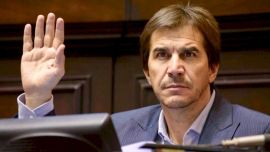The provincial government in Mendoza has put the brakes on controversial modifications to Law 7722, after Governor Rodolfo Suárez called for "a dialogue" over alterations critics say would weaken protections on mining practices in the region.
Suárez, speaking at a press conference on Boxing Day at Government House, said he would suspend the changes for now.
"I will not regulate it," said the provincial leader, saying it was his duty to guarantee the peace as tensions continue to rise and demonstrators take to the streets.
"We are going to call everyone to dialogue: the Church, universities, trade unions, political parties, international organisations. And I will be present personally at the debate," he added.
Protests erupted last week after Mendoza’s lawmakers approved a new version of a Law 7722, which had previously restricted the use of dangerous chemicals in mining operations and blocked water-intensive projects in the region amid concerns over their environmental impact. There have been clashes between police and demonstrators in recent days.
The provincial legislature greenlit the modification of the law with 36 votes in favour, 11 against, one abstention and one absence in the lower chamber, and 28 votes in favour and seven against in the upper chamber.
The proposal was approved thanks to an agreement between Radicals and Peronist lawmakers and paved the way for a wide array of investments in copper, silver and gold extraction projects, with Governor Suárez announcing 19 projects only on Sunday.
Now, five days after the law's passage and amid a strong reaction from environmentalists, agricultural producers and citizens, the Unión Cívica Radical (UCR) leader has made a U-turn.
Speaking Thursday, Suárez said he too cared about the region's water supply and argued that a consensus should reached among civil society given the strong reaction to the changes. He refused to rule out the possibility of holding a referendum on the issue.
Unabated
Activists, who claim the changes pave the way for the use of dangerous chemicals in the region, said they would continue their demonstrations unabated. Through a message circulating on social networks and WhatsApp groups, campaigners said that "to suspend is not to repeal."
"Today, more than ever, we go out to ask for a veto," the message continues, pleading with demonstrators not to "stop the fight" and questioning if Governor Suárez is a trustworthy figure.
Protests are scheduled for tonight in San Rafael, Malargüe, Uspallata, Luján de Cuyo and Mendoza City.
Suárez lashed out Thursday against the rhetoric of some campaigners, accusing them of spreading a campaign of "fear."
"We considered those violent groups that are always there, but what we are seeing has had another dimension," he said. "This fear has penetrated society. They have sown it well and they have done so through lying. There are many who do their political work on this basis of fear."
Suárez, who was sworn in as governor on December 10, called for "a broad debate" and argued that mining projects didn't "automatically" mean there would be "contamination."
"We're going to invite all entities to give their opinion. My children, my grandchildren live here and what I most want is took after the water," he concluded.
– TIMES/NA


























Comments